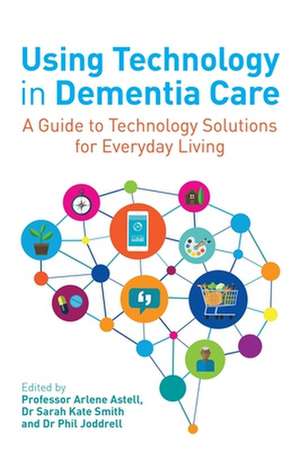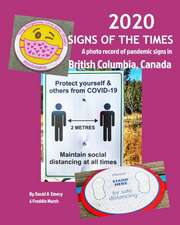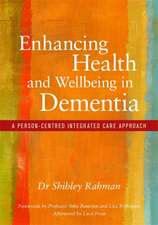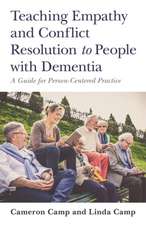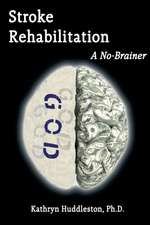Using Technology in Dementia Care
Editat de Arlene Astell, Sarah Smith, Phil Joddrellen Limba Engleză Paperback – 21 iun 2019
Looking at a range of available products, such as off-the-shelf computers and smartphones, to dementia specific applications and programs, it also addresses some common obstacles and barriers faced when introducing technology in dementia care. The past twenty years have seen an array of technologies developed to improve the day-to-day lives of people with dementia; this guide shows how they can be effectively used.
Preț: 200.39 lei
Preț vechi: 266.03 lei
-25% Nou
Puncte Express: 301
Preț estimativ în valută:
38.34€ • 40.04$ • 31.66£
38.34€ • 40.04$ • 31.66£
Carte disponibilă
Livrare economică 25 martie-08 aprilie
Preluare comenzi: 021 569.72.76
Specificații
ISBN-13: 9781785924170
ISBN-10: 1785924176
Pagini: 232
Ilustrații: 18 black and white figures
Dimensiuni: 151 x 229 x 13 mm
Greutate: 0.34 kg
Editura: JESSICA KINGSLEY PUBLISHERS
ISBN-10: 1785924176
Pagini: 232
Ilustrații: 18 black and white figures
Dimensiuni: 151 x 229 x 13 mm
Greutate: 0.34 kg
Editura: JESSICA KINGSLEY PUBLISHERS
Cuprins
Preface. Part One: An Overview of Technology for Dementia. 1. An Introduction to Technology for Dementia. Arlene Astell, Professor of Neurocognitive Disorders, University of Reading UK, and Research Chair in Dementia, Ontario Shores Centre for Mental Health Sciences, Canada, Erica Dove, Research Assistant, Ontario Shores Centre for Mental Health Sciences, Canada, and Dr Alexandra Hernandez, Postdoctoral Researcher, Ontario Shores Centre for Mental Health Sciences, Canada. 2. Assessing the Needs of People with Dementia for Technology. Louise Nygård, Professor of Occupational Therapy, Karolinska Institutet, Sweden, Dr Camilla Malinowsky, Assistant Professor, Department of Neurobiology, Karolinska Institutet, Sweden, and Dr Lena Rosenberg, Assistant Professor, Department of Neurobiology, Karolinska Institutet, Sweden. 3. Ethical Issues in Technology for Dementia. Dr Jennifer Boger, Assistant Professor, Systems Design Engineering and Schlegel Research Chair for Technology in Independent Living, University of Waterloo, Canada, Professor Jeffrey Jutai, Interdisciplinary School of Health Sciences, University of Ottawa, Canada, Dr Anne Moorhead, Senior Lecturer in Health Communication, Ulster University, UK, Maurice Mulvenna, Professor of Computer Science, School of Computing, Ulster University, UK, and Dr Raymond Bond, Senior Lecturer in Data Analytics, Ulster University, UK. Part Two: Technology in the Lives of People with Dementia. 4. Life at Home and Technology With Dementia. Dr Grant Gibson, Lecturer in Dementia Studies, University of Stirling, UK. 5. Outdoor Life and Technology with Dementia. Dr Rens Brankaert, Assistant Professor, Eindhoven University of Technology, the Netherlands and Sandra Suijkerbuijk, Researcher, Vilans and Eindhoven University of Technology, the Netherlands. 6. Leisure Activities and Technology with Dementia. Dr Phil Joddrell, Research Associate, Centre for Assistive Technology and Connected Healthcare, University of Sheffield, UK, and Dr Sarah Smith, Research Associate, Faculty of Social Sciences, University of Sheffield, UK. 7. Technology Use by People with Dementia. Ken Clasper, Tom Hawkins, Ann Johnson, Keith Oliver, with Nada Savitch, Independent Consultant, London, UK. Part Three: Technology Ecosystem for Dementia. 8. Technology for Families of People with Dementia. Dr Emma Wolverson, Clinical Psychologist and Clinical Lecturer, School of Health and Social Work, Faculty of Health Sciences, University of Hull, UK, Rosie Dunn, Research Assistant, School of Health and Social Work, Faculty of Health Sciences, University of Hull, UK, and Caroline White, Research Associate, School of Health and Social Work, Faculty of Health Sciences, University of Hull, UK. 9. Technology for Organisations Supporting People with Dementia. Dr Julie Christie, Region Manager UK and Europe, Dementia Centre, HammondCare, UK and Professor Mary Marshall, Senior Consultant, Dementia Centre, HammondCare, UK. 10. Dementia-friendly Future. Dr Stephen Czarnuch, Assistant Professor, Department of Electrical and Computer Engineering/Discipline of Emergency Medicine, Memorial University, Newfoundland, Canada and Arlene Astell.
Descriere
An accessible guide that combines the latest research with practical advice on how to use currently available technology in dementia care. Looking at both hardware and software, it shows how they can be used to improve the day-to-day lives of people with dementia.
